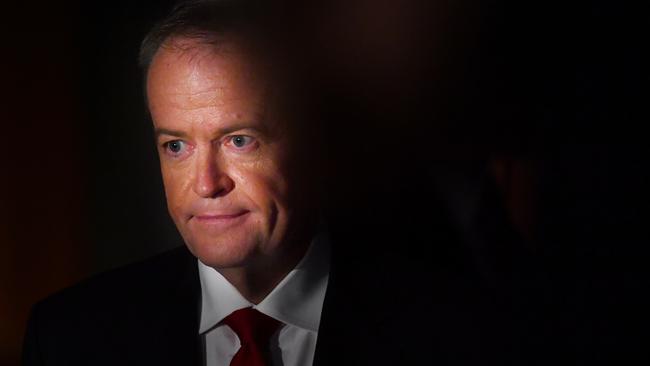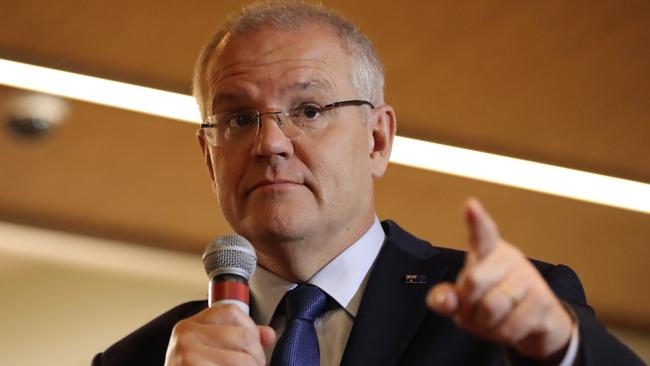Newspoll: Bill Shorten’s billion-dollar promises fail to prevent slide in popularity
As the campaign enters its final two weeks, support for Labor has fallen to its lowest point since Scott Morrison became PM.

Popular support for Labor has fallen to its lowest level since Scott Morrison became Prime Minister in August last year, with voters turning sharply against Bill Shorten despite $16 billion in further spending promises.
As the campaign enters its final two weeks, an exclusive Newspoll conducted for The Australian shows Labor would still win the May 18 election, with the two-party-preferred vote remaining unchanged at 51-49 per cent in its favour.
However, following a week defending the cost of its signature climate change policy, Labor’s primary vote has fallen a further point to 36 per cent.
The gradual erosion of Labor’s core support has driven down the primary vote to the party’s lowest point since the weeks before Malcolm Turnbull lost the Liberal leadership and marks a five-point slide from a high of 41 per cent just six months ago.
The result also locks in a six-point turnaround in the two-party-preferred vote in the past two months, with the Coalition having trailed 46/54 in March on a primary vote of 36 per cent.
The Coalition’s primary vote currently sits at 38 per cent — unchanged from last week — which is still 3.1 points down on the election result in 2016 when the party recorded the narrowest of victories.
Despite strong performances in the two leaders debates last week, with the Opposition Leader winning the audience poll in both, Mr Shorten’s personal ratings have plunged in the second-biggest single fall since 2016, giving him an approval rating of negative 18 points.
He has also fallen two points in the contest over preferred prime minister, with Mr Morrison opening up an 11-point lead, returning him to levels he enjoyed following the April 2 budget, which delivered a plan to cut more than $300bn in personal income tax.

Clive Palmer’s United Australia Party fell a point from 5 per cent last week, giving up ground to One Nation, which rose a point to 5 per cent.
The Greens remained unchanged on 9 per cent, where their support has rested all year.
The poll shows Labor has not been rewarded for its two key cost-of-living policy announcements, including a $2.4bn Medicare-backed dental scheme for three million pensioners and a $4bn childcare package to deliver free childcare for 887,000 families.
In the past week, Mr Shorten has also announced a taxpayer-funded wage supplement for childcare workers, who are among the lowest-paid professionals, which will cost the budget an estimated $10bn.
The Labor leader was also forced on to the defensive over the cost of Labor’s emissions reductions targets following independent modelling suggesting it could come at a cost of more than $200bn to the economy over the next decade.
Labor’s primary vote has been on a slow decline over the past three weeks, falling from 39 per cent in mid-April to 36 per cent in the latest Newspoll conducted between May 2 and May 5 on a survey sample of 2003 voters nationally.
The numbers remain higher than the 2016 election when it recorded just a 34.7 per cent primary vote.
With Greens’ preferences, Labor would still win between six and 10 seats at the election, securing it a decisive victory.
Mr Morrison’s satisfaction ratings fell a point to 44 per cent but were countered by a fall of those unhappy with his performance to 45 per cent.
Approval of Mr Shorten’s performance over the past week fell four points to 35 per cent while those dissatisfied blowing out two points to 53 per cent, delivering the Labor leader a net negative satisfaction ratings of minus 18.
Support for other minor parties and independents rose a point to 8 per cent which is 3.7 percentage points lower than they received at the last election.




To join the conversation, please log in. Don't have an account? Register
Join the conversation, you are commenting as Logout